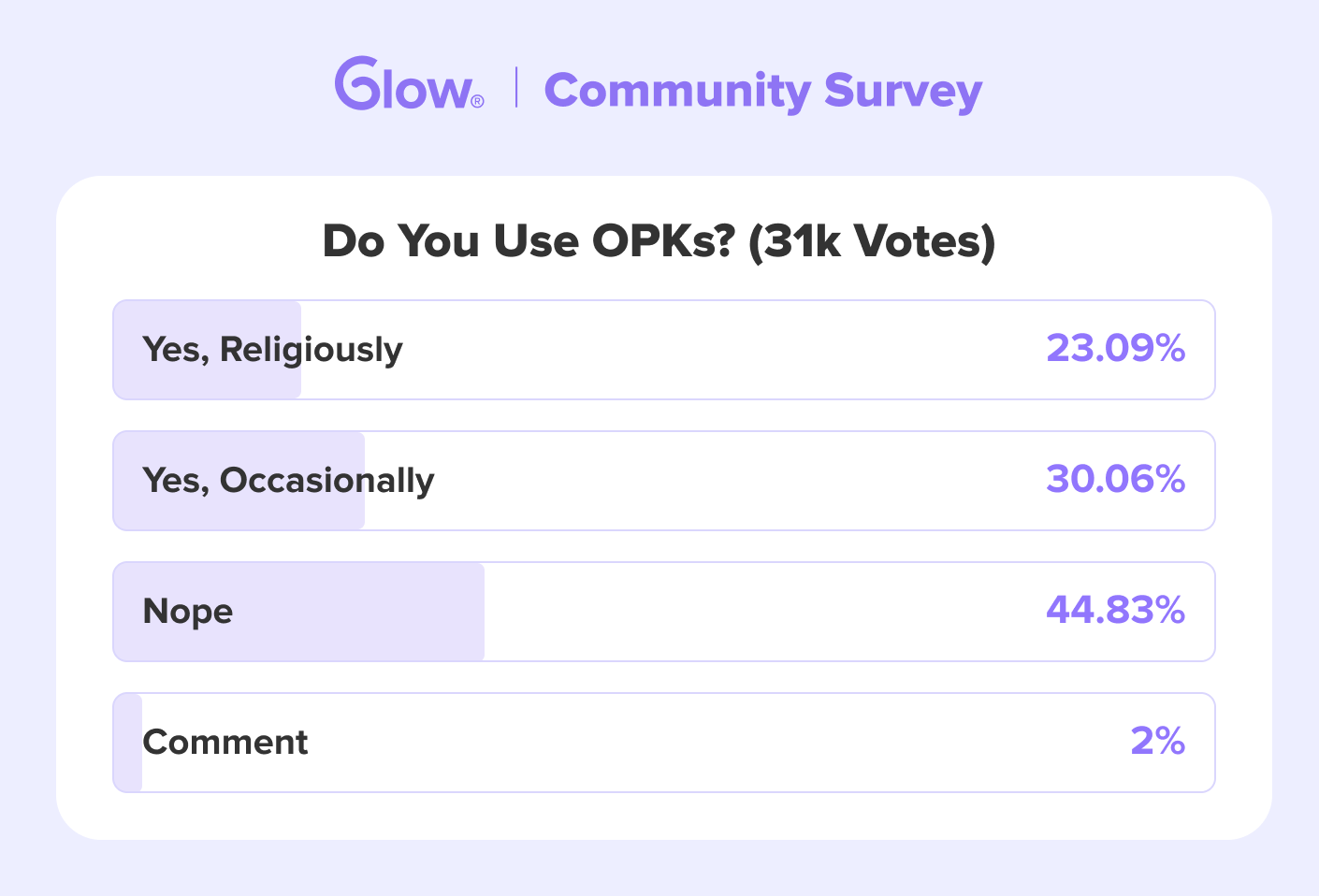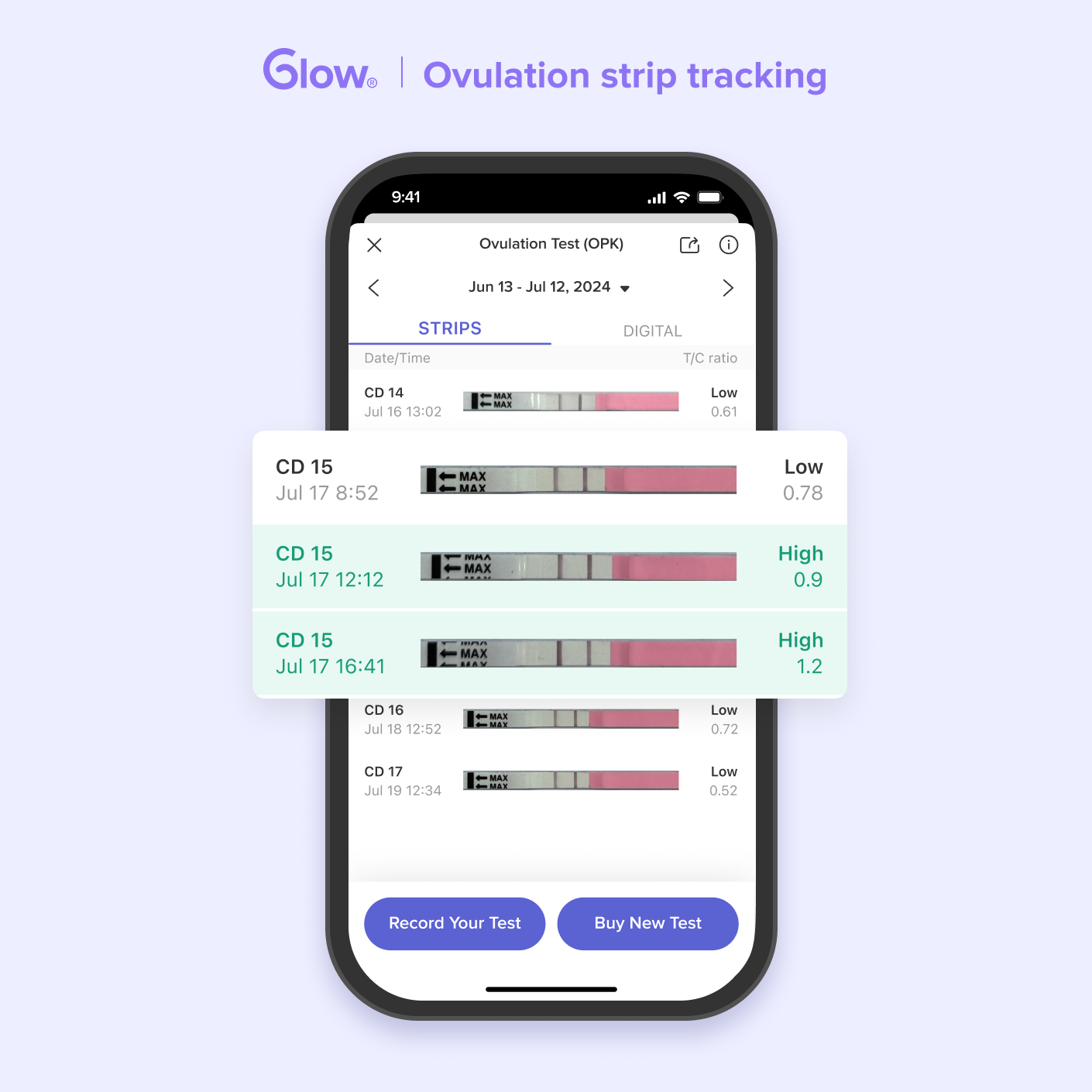Understanding your menstrual cycle can be crucial for a variety of reasons, from family planning to gaining insights into your overall health. One of the tools available for women to better understand their cycle is the ovulation test. But, is it the right choice for you? Let’s delve into what an ovulation test is, its benefits, who should consider using it, and some alternatives you might want to explore.
Glow Community Survey: Do you use OPKs?
In a Glow Community survey answered by over 30,000 women who are trying to conceive, over 23% said they religiously used OPKs; 30% reported using OPKs occasionally.

What is an Ovulation Test?
An ovulation test, also known as an ovulation predictor kit (OPK), is designed to detect the surge in luteinizing hormone (LH) that occurs just before ovulation. This surge typically happens 24 to 36 hours before the ovary releases an egg, making it a crucial window for those trying to conceive. These tests are commonly available in the form of urine test strips that you dip into a urine sample, much like a home pregnancy test.
Benefits of Using an Ovulation Test
- Pinpointing Fertile Days: The most significant advantage of using an ovulation test is its ability to identify your most fertile days. This can be particularly helpful for couples trying to conceive, as knowing the exact timing of ovulation maximizes the chances of fertilization.
- Ease of Use: Ovulation tests are relatively easy to use and interpret. Most come with clear instructions and visual indicators to help you understand when you’re most fertile.
- Predictive Accuracy: While no method is foolproof, ovulation tests are generally reliable at predicting the LH surge, thus giving you a good estimate of when ovulation is likely to occur.
- Cycle Monitoring: These tests can also help you understand your menstrual cycle better, which can be valuable information for discussing reproductive health with your healthcare provider.
- Quick Results: You can usually get test results within a few minutes, allowing for immediate insights into your fertility status.
- Improving Chances of Conception: By accurately identifying the optimal days for conception, ovulation tests can increase the likelihood of pregnancy. This targeted approach can be particularly beneficial for women experiencing difficulties with conception.
- Non-Invasive Method: Unlike some other fertility tests and treatments, ovulation tests are non-invasive and can be done in the privacy of your home, making them a convenient option for many women.
- Cost-Effective Solution: Compared to more advanced fertility treatments, ovulation tests are relatively inexpensive and provide valuable information without the high costs associated with other methods.
Who Should Consider Using an Ovulation Test?
- Couples Trying to Conceive: Ovulation tests are particularly beneficial for couples who are actively trying to get pregnant. Knowing when you’re most fertile can significantly increase your chances of conception.
- Women with Irregular Cycles: If you have irregular menstrual cycles, tracking ovulation can be more challenging. An ovulation test can offer insights and help you better understand your unique cycle patterns.
- Those Using Intrauterine Insemination (IUI): Ovulation monitoring is crucial during IUI cycles.
- Anyone Wanting to Maximize Pregnancy Chances: Ovulation tests help time intercourse effectively.
- Those Seeking More Information About Their Cycle: Whether or not you’re trying to conceive, understanding your ovulation patterns can be a critical component of overall reproductive health.
When does OPK not Work?
Unfortunately, there are actually quite a few reasons why ovulation tests might not work correctly.
- Ovulation tests won’t work when certain fertility drugs are present in the body, such as the hormone hCG.
- Ovulation tests might not work for those over 40 years old. Some women over 40 have increased levels of LH in their systems, and that can throw off the test.
- Ovulation tests might not work for those with PCOS, since women with PCOS often have high LH levels to begin with.
Alternatives to Ovulation Tests
- Basal Body Temperature (BBT) Charting: This method involves taking your temperature first thing every morning before getting out of bed. A slight increase in basal body temperature indicates that ovulation has recently occurred.
- Cervical Mucus Monitoring: Changes in cervical mucus can also provide clues about your fertility. Around the time of ovulation, cervical mucus becomes clear, stretchy, and egg-white in consistency.
- Ovulation Calculators and Apps: Numerous digital tools can estimate your fertile window based on the duration of your menstrual cycles. Apps like Glow enable users to log comprehensive health data, including ovulation test results, to pinpoint fertile windows with greater accuracy.

- Fertility Monitors: More advanced than ovulation tests, fertility monitors track both LH and estrogen levels over a more extended period. Though more expensive, they provide a comprehensive overview of your fertility status.




